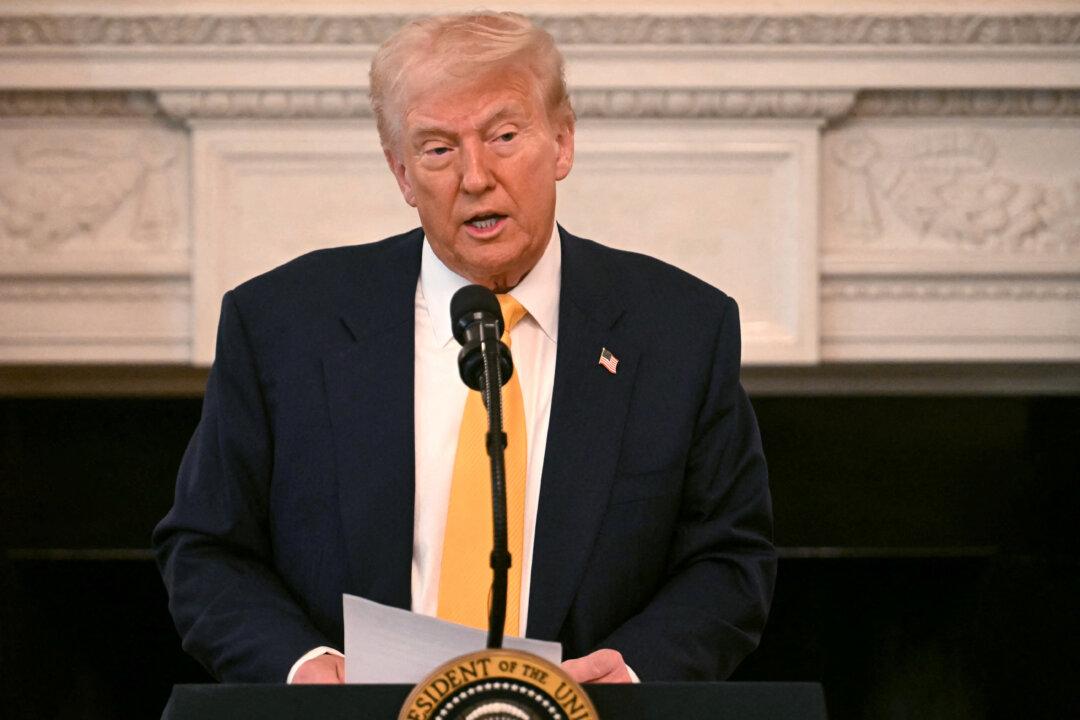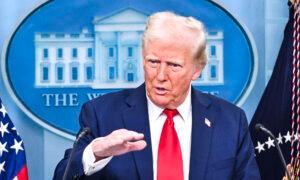Judge Partially Blocks Trump’s Orders Curbing DEI Programs
 President Donald Trump speaks at the Governors Working Session in the State Dining Room of the White House on Feb. 21, 2025. Jim Watson/AFP via Getty Images
President Donald Trump speaks at the Governors Working Session in the State Dining Room of the White House on Feb. 21, 2025. Jim Watson/AFP via Getty ImagesA federal district judge on Feb. 21 issued an order partly blocking President Donald Trump’s executive orders withdrawing support for so-called diversity, equity, and inclusion (DEI) programs.
U.S. District Judge Adam Abelson in Maryland granted a preliminary injunction against the executive actions in a lawsuit known as National Association of Diversity Officers in Higher Education v. Trump.After determining that the executive actions likely violate the U.S. Constitution, including the free speech protections of the First Amendment, Abelson forbade the Trump administration from ending or modifying DEI-related federal contracts and grants.The judge wrote that because the executive orders under challenge are vague, federal contractors and recipients of grants have “no reasonable way to know what, if anything, they can do to bring their grants into compliance.”
He gave the example of a road construction grant aimed at filling potholes in a poor neighborhood, as opposed to a wealthy neighborhood. Would the grant be “equity-related,” Abelson asked.
The judge’s order permits the U.S. Department of Justice to investigate and issue a report on DEI practices, as one of the executive orders requires.
Related Stories

The plaintiffs are the City of Baltimore, and higher education groups that receive federal funding. They filed a lawsuit against the administration earlier in the month claiming the executive orders went beyond the president’s powers and chill free speech.
“What’s happening is an overcorrection and pulling back on DEI statements,” Aleshadye Getachew, a plaintiff’s attorney, said at a court hearing on Feb. 19.The Trump administration has taken the position that the president is taking aim only at DEI programs that run afoul of federal civil rights laws and that he may make spending decisions based on his policy priorities.
“The government doesn’t have the obligation to subsidize plaintiffs’ exercise of speech,” said U.S. Department of Justice attorney Pardis Gheibi.
According to the complaint, Trump is attempting to “erase diversity, equity, inclusion, and accessibility from our country.” The president is not allowed to “usurp Congress’s exclusive power of the purse, nor can he silence those who disagree with him by threatening them with the loss of federal funds and other enforcement actions.”
Executive Order 14151 directs the Office of Management and Budget and the Department of Justice to “coordinate the termination of all discriminatory programs,” including “illegal DEI and ‘diversity, equity, inclusion, and accessibility’ (DEIA) mandates, policies, programs, preferences, and activities in the Federal Government, under whatever name they appear.”President Joe Biden used the DEIA acronym in Executive Order 14035 signed June 25, 2021, which required each federal agency to appoint a chief diversity officer or a diversity and inclusion officer. Accessibility in this context means “federal workspaces must be fully accessible to employees with disabilities,” according to the Access Board’s website.The Office of Personnel Management was tasked with creating a plan for implementing DEIA across the agencies, the Congressional Research Service reported in June 2024. Trump rescinded Executive Order 14035 when he signed Executive Order 14148 on Jan. 20.Trump’s Executive Order 14173 targets “dangerous, demeaning, and immoral race- and sex-based preferences under the guise of so-called ‘diversity, equity, and inclusion’ (DEI) or ‘diversity, equity, inclusion, and accessibility’ (DEIA) that can violate the civil-rights laws of this Nation.”The plaintiffs said in the complaint that the executive orders have left them in a difficult position.
“As federal agencies make arbitrary decisions about whether grants are ‘equity-related,’ Plaintiffs are left in limbo. Some have received notifications to cease all work on federally funded programs with connections to DEIA.”
Because the two executive orders are vague, the plaintiffs “are left to wonder whether, and for how long, they can rely on the federal funding that Congress appropriated using its exclusive power of the purse,” the complaint said.
In a reply brief, the government argued that the court should not block the executive orders because the plaintiffs failed to demonstrate that they would suffer “irreparable harm” if the court failed to act.The brief noted that the plaintiffs said they faced irreparable harm because of the possible loss of funding, uncertainty about future operations, damages to their reputation, and a chilling of their speech.
“None of them meet the demanding standard of irreparable harm” that is required to halt the executive orders, the brief said.
The Associated Press contributed to this report.